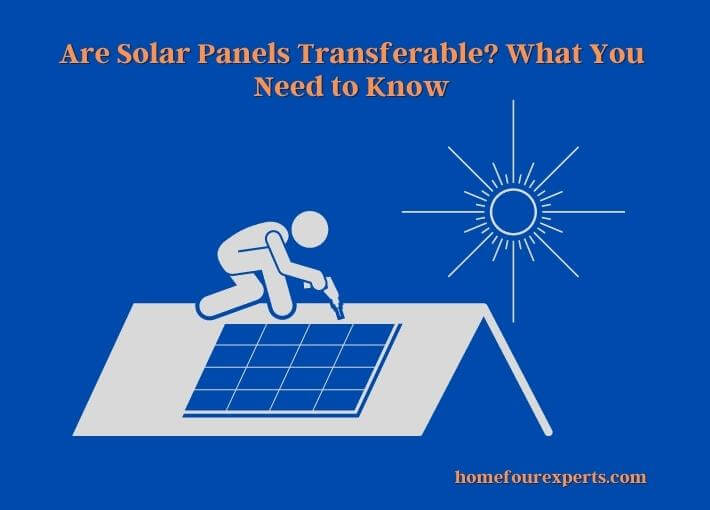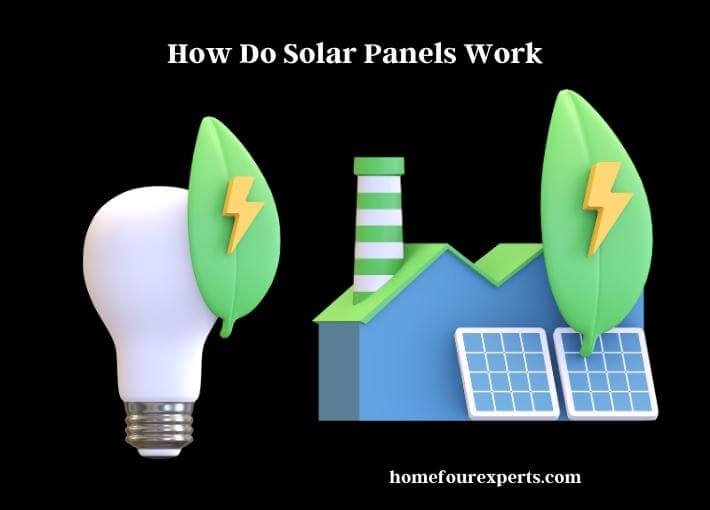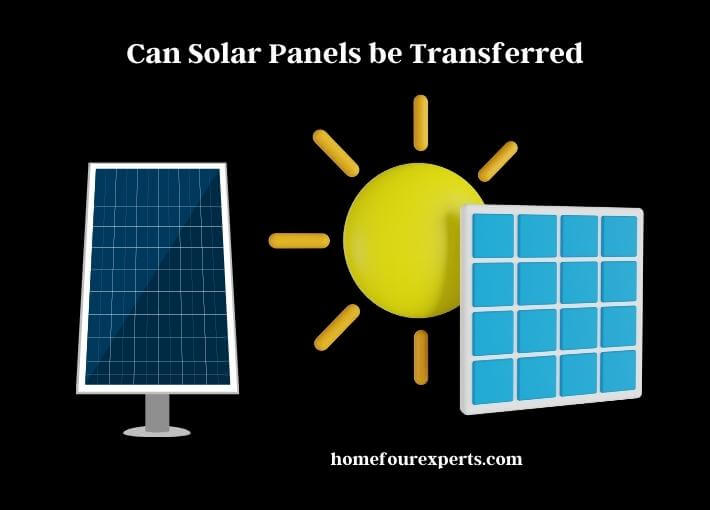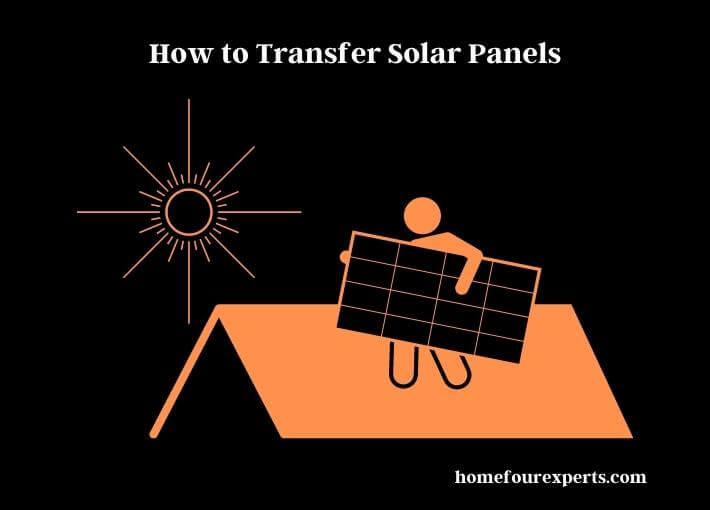Solar panels have become an increasingly popular source of renewable energy for homeowners across the globe. They are a cost-effective way to reduce your reliance on traditional power sources and can even save you money in the long run.

We will explore the ins and outs of transferring solar panels, including the factors you need to consider before making a decision and the steps involved in the transfer process.
How Do Solar Panels Work?
Solar panels work by converting sunlight into electricity through a process known as the photovoltaic effect. The panels are made up of solar cells, which are typically made of silicon and other materials.
When sunlight hits the solar panels, the solar cells absorb the energy from the sunlight and release electrons. These electrons are then collected by a circuit in the solar panel, which converts them into usable electricity.

The electricity generated by the solar panels can be used to power your home or business, or it can be fed back into the grid for others to use. The amount of electricity generated by the solar panels will depend on a number of factors, including the size and number of panels, the amount of sunlight they receive, and the efficiency of the panels.
Solar panels are a clean and renewable source of energy that can help reduce your carbon footprint and save you money on your energy bills.
Can Solar Panels be Transferred?
Yes, solar panels can be transferred from one location to another. However, there are several factors that you need to consider before deciding to transfer your solar panels.
The first thing you need to consider is the age of your solar panels. If your solar panels are older than 10 years, they may not be worth transferring, as their efficiency may have decreased significantly over time. Older panels may not be compatible with newer equipment, which could make it difficult to reinstall them in your new location.
Another factor to consider is the condition of your solar panels. If your panels are damaged or in need of repairs, it may be more cost-effective to replace them rather than transfer them. In addition, if your panels are leased or financed, you may not be able to transfer them without incurring additional fees or penalties.

You should also consider the local regulations and permits required for solar panel installations in your new location. Some areas may require a permit for solar panel installations, and the installation process may require inspections or approvals from local authorities.
You should consider the cost of transferring your solar panels. The cost will depend on several factors, including the distance between your old and new locations, the size and number of panels being transferred, and the cost of labor for the installation.
Some people may have concerns about the weather resistance of solar panels, especially in regions that experience extreme weather conditions.
How to Transfer Solar Panels?
If you have decided to transfer your solar panels, here are the steps you should take:
Step 1
Before you move, you should contact your solar panel installer to discuss the transfer process. They can advise you on the best way to proceed and may be able to recommend a new installer in your new location.
You should also take steps to ensure that your solar panels are in good condition for the move. This may involve cleaning them, making any necessary repairs, and checking for any damage.
Step 2
Once you have moved, you will need to find a new solar panel installer to reinstall your solar panels. You can start by asking for recommendations from friends and family or by searching online for solar panel installers in your area.

When choosing a new installer, be sure to check their credentials and experience. You should also ask if they offer a transferable warranty and if they have experience transferring solar panels from one location to another.
Step 3
Once you have chosen a new installer, they will need to assess the condition of your solar panels and determine if any repairs or maintenance are needed before they can be installed. They will then reinstall the panels, ensuring that they are properly connected to your home’s electrical system.
Preparing for Solar Panel Transfer
Solar panels can provide a significant amount of energy savings over time, and they are also environmentally friendly. If you’re planning to move to a new location, you may be wondering if you can take your solar panels with you. The good news is that solar panels can be transferred, but it requires careful planning and execution.
Check Your Lease Agreement
If you’re leasing your solar panels, you’ll need to check your lease agreement to determine if transferring your panels is possible. Some lease agreements may have restrictions or additional costs associated with transferring the panels. If you’re unsure, contact your solar panel provider to review your agreement and discuss your options.

Find a Qualified Solar Panel Installer
It’s important to work with a qualified solar panel installer who has experience with solar panel transfers. They can provide guidance on the proper way to remove, transport, and reinstall your panels to ensure that they continue to function properly.
Evaluate Your New Location
Before you transfer your solar panels, you’ll need to evaluate your new location to determine if it’s suitable for solar energy. Factors to consider include the amount of sunlight the location receives, the orientation and angle of the roof, and any shading that may impact the performance of the panels. Your installer can perform a site assessment to determine if the new location is suitable for solar panels.
Determine the Costs
The costs associated with transferring your solar panels will depend on several factors, including the size and number of panels, the distance between your old and new locations, and any additional equipment or labor required for the transfer. Your installer can provide you with an estimate of the costs associated with the transfer.
Plan for the Transfer
Once you’ve determined that a solar panel transfer is feasible, it’s important to plan the transfer carefully. This may include scheduling the transfer during a time of year when weather conditions are favorable, securing permits and approvals for the transfer, and coordinating with your installer to ensure that the transfer is executed smoothly.
Legal Considerations for Solar Panel Transfer
When transferring solar panels to a new location, there are several legal considerations to keep in mind. These may include:
Building Codes
Each state and local jurisdiction has its own building codes and regulations that must be followed when installing solar panels. When transferring panels to a new location, it’s important to ensure that the installation complies with local building codes and regulations. Your installer can help ensure that the installation meets these requirements.
Permits and Approvals
Depending on the location of your new property, you may need to obtain permits or approvals from local authorities before installing solar panels. Your installer can help you navigate the permitting process and ensure that all necessary approvals are obtained before installation begins.
Utility Interconnection
If you plan to connect your solar panels to the grid, you’ll need to comply with the utility’s interconnection requirements. This may include obtaining approval from the utility, installing additional equipment, or complying with specific technical standards. Your installer can help ensure that your installation complies with these requirements.
Lease Agreements
If you’re leasing your solar panels, you’ll need to review your lease agreement to determine if transferring your panels is allowed. Some lease agreements may have restrictions or additional costs associated with transferring the panels. If you’re unsure, contact your solar panel provider to review your agreement and discuss your options.
Insurance
It’s important to ensure that your solar panels are properly insured during the transfer process. Your installer can provide guidance on insurance requirements and ensure that your panels are covered in the event of damage or loss during the transfer.
Advantages and Disadvantages of Moving Solar Panels
| Advantages | Disadvantages |
| Can take advantage of better sun exposure at the new location | Expensive to move |
| Can avoid shading or obstruction at the previous location | May require new permits and approvals |
| Can increase energy production with a better location | May require additional equipment or modifications |
| Can retain investment in solar panels | Risk of damage or loss during transport or installation |
| Can maintain a commitment to renewable energy | May require adjustments to utility interconnection |
| Can increase property value with solar panel installation | May not be practical or possible to move in all situations |
While moving solar panels can have several advantages such as taking advantage of better sun exposure and avoiding shading or obstruction, it can also be expensive and require new permits and approvals. There may be a risk of damage or loss during transport or installation and it may not be practical or possible to move in all situations. It’s important to carefully consider the advantages and disadvantages and work with a qualified installer to ensure that the transfer is completed safely and in compliance with all applicable laws and regulations.
Last Point
Transferring solar panels can be a great way to take advantage of renewable energy at a new location. However, it’s important to follow the proper steps and work with a qualified installer to ensure that the transfer process goes smoothly.
By removing the panels carefully, transporting them safely, and installing them properly at the new location, you can continue to benefit from the cost savings and environmental benefits of solar energy.
It’s important to consider the terms of any lease agreements or local regulations that may impact the transfer process. With proper planning and execution, you can enjoy the benefits of solar energy at your new location for years to come.
If you want to know are solar panels aesthetic? Here is the reply.
About This Writer

Hi, I am responsible for the 'Homeowners Power Solutions' category. My name is Liam Jaxon and a licensed technician with 7 years of experience in vehicle batteries, electrical gadgets, and home appliances. My working experience in different residential & light commercial electrical sectors and the automobile industry helped to acquire vast knowledge in this industry.